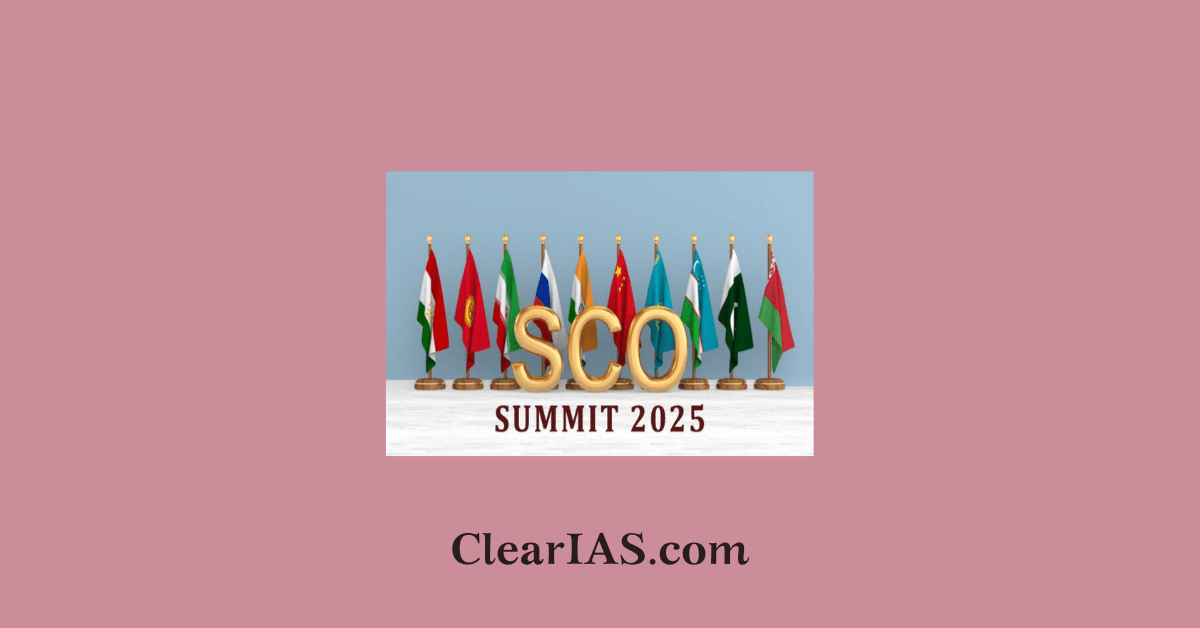
The 25th Council of Heads of State Summit of the Shanghai Cooperation Organisation (SCO) concluded in Tianjin, China, adopting the Tianjin Declaration. It outlined the grouping’s priorities on security, sustainable development, reforms in global governance, and technological cooperation. Read here to learn more.
The SCO Summit 2025 marked a crucial moment for the Shanghai Cooperation Organisation (SCO) as it seeks to expand its role amid shifting geopolitical realities and growing challenges in Eurasia and beyond.
Key Outcomes of the Tianjin Declaration
- Counterterrorism and Regional Security
- The declaration rejected double standards in counterterrorism, underscoring the need for genuine global cooperation to combat the cross-border movement of terrorists.
- It condemned the terrorist attack in Pahalgam, Jammu and Kashmir, while notably avoiding any mention of Pakistan, reflecting delicate balancing within the group.
- The declaration condemned U.S. and Israeli military strikes on Iran, underlining the bloc’s opposition to unilateral military interventions.
- Non-Proliferation and Conflict Resolution
- Reaffirmed commitment to a nuclear-weapon-free world and called for peaceful resolution of regional conflicts through dialogue.
- Emphasized support for international treaties that prevent the proliferation of weapons of mass destruction.
- Reforming Global Institutions
- Called for comprehensive reform of the United Nations to adapt it to “modern realities.”
- Emphasized the need to enhance the representation of developing countries in the UN’s governing bodies, especially the Security Council.
- Sustainable Development and Social Agenda
- Expressed support for equal rights of all countries in the development and use of Artificial Intelligence (AI), stressing responsible innovation and regulation.
- Endorsed India’s global vision of “One Earth, One Family, One Future”, reinforcing the principle of inclusive and sustainable development.
- Reiterated commitments towards the 2030 Agenda for Sustainable Development, covering poverty reduction, healthcare access, climate change, and food security.
- China’s Push to Expand SCO’s Influence
- SCO members were offered access to China’s BeiDou satellite navigation system, providing an alternative to GPS and strengthening technological interdependence.
- China pledged $1.4 billion in loans over three years to support SCO projects in infrastructure, connectivity, and green development.
- Proposed the creation of an SCO Development Bank, signalling Beijing’s intent to make SCO a more financially integrated bloc.
The SCO Plus Summit
China chaired the SCO Plus Summit, which brought together:
- Member states, observer states, and dialogue partners,
- Honoured guests from partner countries, and
- Heads of major international organisations.
This platform reinforced the SCO’s ambition to act not only as a regional security grouping but also as a wider Eurasian multilateral forum shaping economic, technological, and political norms.
India’s Position at the SCO Summit
The Indian Prime Minister highlighted three key pillars for the SCO’s future:
- Security: Emphasizing cooperation against terrorism, extremism, and drug trafficking.
- Connectivity: Positioning the SCO as a hub for infrastructure and digital connectivity across Eurasia.
- Opportunity: Expanding mutual opportunities in trade, technology, and energy partnerships to ensure inclusive growth.
India also reiterated its commitment to sovereignty, territorial integrity, and non-interference, while showcasing its leadership in sustainability and digital governance.
Significance of the Tianjin Summit
- Strategic Balancing: The declaration reflects ongoing tensions, addressing terrorism in South Asia, conflict in West Asia, and calls for multipolarity in global governance.
- Economic Orientation: With proposals for an SCO Development Bank and satellite cooperation, the summit signaled the grouping’s shift toward deeper economic integration.
- India’s Role: Recognition of India’s sustainable development vision demonstrates its rising influence in shaping SCO’s social and developmental agenda.
- China’s Leadership: The summit highlighted Beijing’s efforts to consolidate SCO as a platform that supports its strategic and financial ambitions.
Evolution of SCO Declarations (2022–2025)
Samarkand Declaration 2022, Uzbekistan
- Theme: Post-pandemic recovery & regional security
- Strong focus on terrorism, extremism, and separatism; Called for a “multipolar world”.
- Stressed reforming the UN & supporting multilateralism.
- Pushed for regional trade, transport corridors; Supported Belt & Road.
- Mentioned digital economy cooperation, but with limited details.
- India emphasised connectivity via Chabahar Port and rejected China’s BRI.
Astana Declaration 2023, Kazakhstan
- Theme: Food security, energy transition, climate
- Condemned terrorism & drug trafficking; supported Afghanistan’s stability.
- Called for the democratisation of international relations; more voice for developing nations.
- Highlighted energy cooperation (renewables, oil & gas); focus on the SCO Energy Club.
- Greater push on digital transformation, AI, and fintech.
- India showcased the Global Biofuels Alliance & promoted clean energy.
Tianjin Declaration 2025, China
- Theme: Tech-driven multipolarity, sustainable growth
- Rejected double standards in counterterrorism; condemned the Pahalgam terror attack; opposed US-Israel strikes on Iran.
- Strong call for UN reform, esp. Security Council representation for developing countries.
- Proposed SCO Development Bank; China pledged $1.4B loans; BeiDou satellite access.
- Equal rights in AI use, digital governance, and expanded space/satellite use.
- India’s “One Earth, One Family, One Future” vision endorsed, promoted security, connectivity & opportunity.
Conclusion
The Tianjin Declaration underscores the SCO’s intent to strengthen itself as a security, economic, and development forum amid a rapidly changing geopolitical environment.
By focusing on counterterrorism, UN reforms, digital and AI governance, and sustainable development, the summit highlighted both common ground and subtle divergences among members.
For India, the summit was an opportunity to project its vision of connectivity, security, and sustainable opportunity, even as China deepened its leadership role through financial and technological initiatives.
Related articles:






Leave a Reply